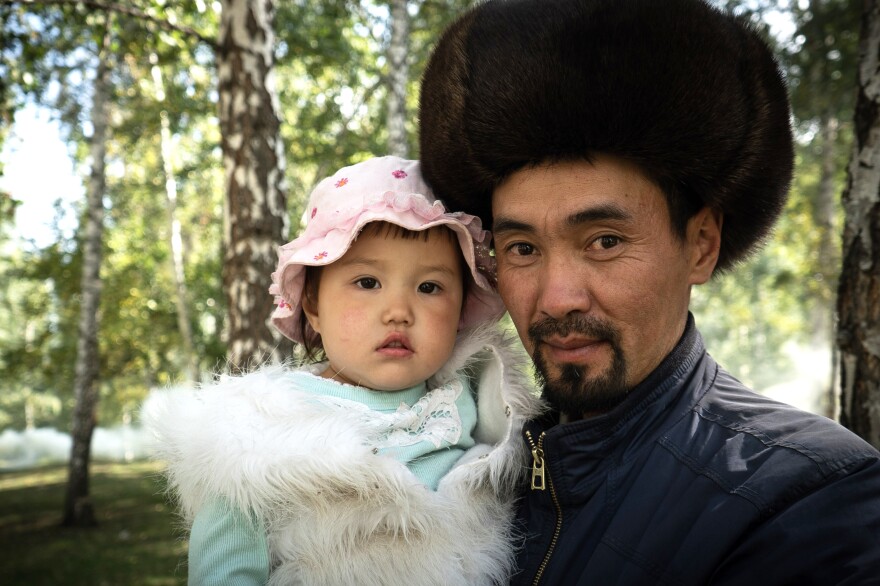Two bare-chested men on horseback wrestle. The goal is to pull your opponent off the horse so a part of his body touches the ground.
Three dogs chase a dummy clad in a fox or hare skin to see who's fastest. Biting an opponent is grounds for disqualification.

And then there is this sport: "Each team seeks to throw as many goat carcasses as possible into the tai kazan (goal) of the opposing team."
They're definitely not Olympic sports but they are a part of another global competition: The World Nomad Games, held in Kyrgyzstan last September. That's the landlocked central Asian nation of 6.2 million that, centuries ago, was a stop on the Silk Road traveled by traders from China to the Mediterranean. In modern times, it was part of the Soviet Union until it declared independence in 1991.

This was the third iteration of the games, which were spearheaded by former Kyrgyzstani president Almazbek Atambayev and highlight both unusual regional sports as well as more traditional ones like archery. According to the local press, 2,000 athletes from 80 countries competed before an audience of 150,000, about a third of whom were foreign tourists. The overall cost was about $6.7 million, with $2.3 million covered by private sponsors and the rest picked up by the government.

The government involvement has prompted some local criticism, according to a New York Times report. "Keep in mind that Kyrgyzstan, compared to its neighbors, is a relatively open country with regard to freedom of speech. So people there tend to be more vocal in criticizing the actions of the government," wrote Kanybek Nur-tegin, a professor of economics at Florida Atlantic University who grew up in Kyrgyzstan. "While the country could indeed have used the funds on other pressing issues, I think the idea of bringing people together to enjoy peaceful events, reviving cultural traditions and hosting guests from dozen of countries is a great idea."
In a country that's not rich in natural resources, he adds, "tourism is a promising industry."
Nurtegin thinks the games "have put Kyrgyzstan on the world map."

Nicolas Tanner, a photojournalist and student at the Institute for Doctoral Studies in the Visual Arts in Portland, Maine, chronicled the third World Nomad Games. "There were so many bloggers there," Tanner says, "to do Instagram stories, showing this thing to the world."
Tanner, who was a Peace Corps volunteer in the Kyrgyz village of At-Bashy from 2008 to 2010, spoke with us about the Games.

How do the Kyrgyz maintain their ancient traditions in the face of modern influence?
By choosing to stay by super hardcore tradition – their sense of tradition is sacred to them. If you ask a Kyrgyz person who their father's father's father's father's father was, they can tell you. They can tell you who was in their family like seven generations back. That's how you bring the past forward.

Are there still nomads among the Kyrgyz people?
Kyrgyz are partially nomadic: In the winters [some of them] live in a house, then in the summers they'll go out. Traditionally, they would just go out in what's called the jailoo, which is a mountain pasture. Now they have these cellphones, and they can communicate back down to their families or with each other. So it makes their ease of movement actually easier or more efficient.
Cellphones in general are sort of a wild, little nomadic tool — it sort of makes all of us nomadic. We can now kind of be anywhere and still be communicating to anywhere else.

Since we're Goats and Soda, I have to ask: what is headless goat polo like?
It's called kok-boru [which means gray wolf, said to be the animal first used in this sport.]
They cut the hooves and the head off the goat. They're basically [two teams of] men on horses trying to get the goat into the other team's goal. It's a physical game, guys get bloody and horses fall down.

The next set of games, in 2020, will take place in Turkey – which is one of the sponsoring countries. How do the locals in Kyrgyzstan feel about that?
I did talk to some that said essentially, That's fine, whatever. But these games are mostly Kyrgyz and we created the games, so why not keep it here? Well, because it's worth money now, so Turkey wants in.
Freelance writer Joel Goldberg covers sports, science and culture and has contributed to NPR, National Geographic Magazine and On Tap Magazine.
Copyright 2023 NPR. To see more, visit https://www.npr.org.



